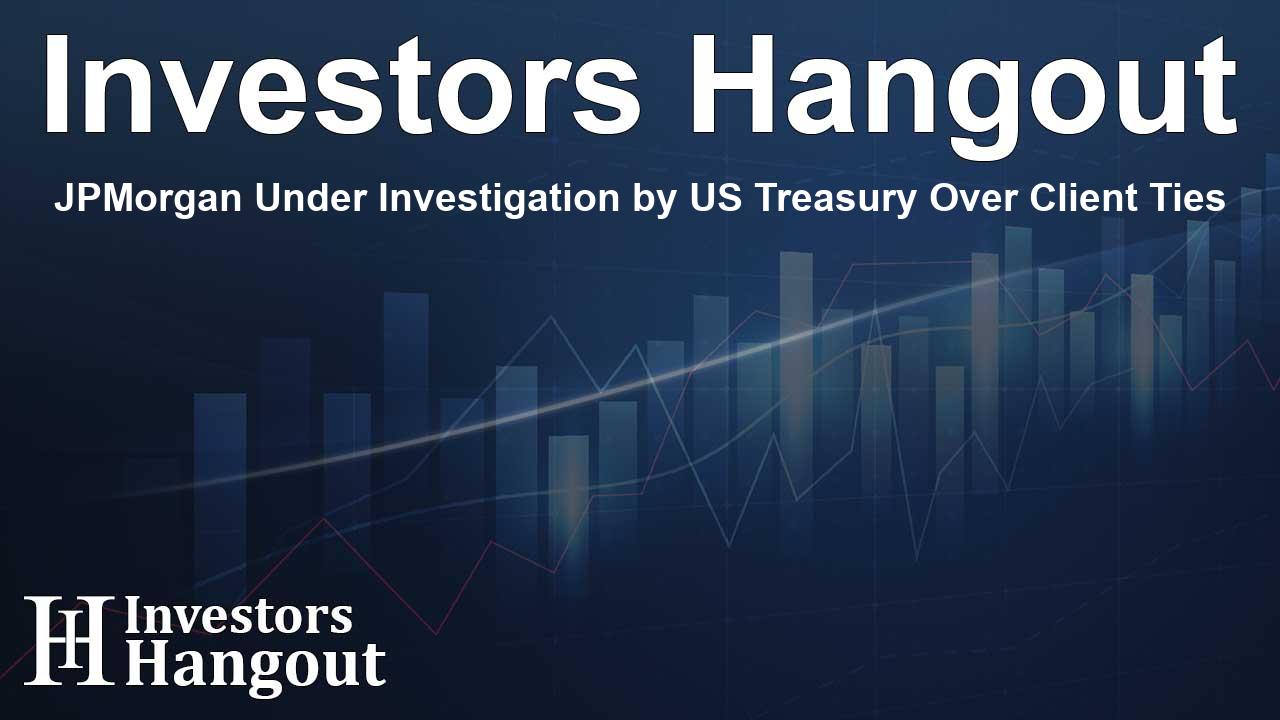JPMorgan Under Investigation by US Treasury Over Client Ties

US Treasury Probes JPMorgan Chase's Client Connections
The US Treasury Department has initiated an investigation into JPMorgan Chase & Co. (NYSE: JPM) concerning its engagements with Ocean Leonid Investments Ltd., a hedge fund associated with the Iranian oil trader, Hossein Shamkhani. This probe is particularly focused on whether the financial institution complied with existing regulations in its dealings with this client, whose operations have recently been put on hold by the financial regulatory authorities in Dubai.
Background of the Investigation
This inquiry, which is still in its early stages, was ignited by a report that surfaced on an unspecified date, revealing Ocean Leonid as a hedge fund with operational bases in London, Dubai, and Geneva. The report claims that Hossein Shamkhani is overseeing the firm's activities. Industry insiders have indicated that JPMorgan, in tandem with ABN Amro Bank NV and Marex Group Plc, extended financial leverage to support Ocean Leonid.
Responses from JPMorgan and Authorities
Both JPMorgan and the US Treasury have refrained from giving public comments regarding the investigation's details. There have also been no statements from Ocean Leonid’s representatives or Hossein Shamkhani, who has opted to communicate through legal counsel.
Denials from Ocean Leonid and Shamkhani
Previously, a spokesperson for Ocean Leonid denied any claims linking Shamkhani to the hedge fund. This was further supported by statements from Shamkhani's attorney, who dismissed any associations between his client and the investment firm. The situation remains complex, with various parties maintaining their disconnections from the hedge fund.
Current Standing and Regulatory Considerations
Market sources suggest that JPMorgan is not mandated to immediately cut ties with Ocean Leonid, given that neither the hedge fund nor Shamkhani are currently included on any sanctions lists. However, the crux of the Treasury's investigation appears centered on Shamkhani's conduct. Moreover, JPMorgan is also under scrutiny regarding potential compliance oversights related to their customer engagements.
Broader Regulatory Scrutiny
The Federal Reserve is conducting its assessments of Western financial institutions' connections to Shamkhani’s network. The central banking authority has yet to issue any public statements on these investigations, but the ongoing analysis reflects growing concerns within the sector.
Banking Regulations and Compliance Standards
It is essential to recognize that US regulations compel banks operating within its jurisdiction to perform comprehensive due diligence on their clients to mitigate risks related to money laundering and terrorist financing. Financial organizations must promptly report any suspicious activities to the appropriate regulatory authorities. In this context, entities like the Office of the Comptroller of the Currency and the Federal Reserve have a crucial role in making sure that banks implement strict and effective compliance systems to adhere to these legal requirements.
Implications of Shamkhani's Background
A noteworthy element in this investigation is the background of Hossein Shamkhani's father, Ali Shamkhani. As a senior advisor to Iran's Supreme Leader, Ayatollah Ali Khamenei, Ali Shamkhani was sanctioned in January 2020 by the Treasury's Office of Foreign Assets Control due to his significant influence in Iran's defense policies and the coordination of various national endeavors. This connection raises further questions about the implications of such familial ties in the realm of international finance.
Frequently Asked Questions
What is the main focus of the US Treasury's investigation into JPMorgan Chase?
The investigation primarily centers on JPMorgan's compliance with regulations regarding its dealings with Ocean Leonid Investments Ltd., a hedge fund linked to Hossein Shamkhani.
Why is Ocean Leonid Investments Ltd. under scrutiny?
Ocean Leonid has been suspended by Dubai's financial free zone, which has drawn attention to its operations and its leadership linked to Iranian oil trading.
Have JPMorgan or the US Treasury commented on the investigation?
No, both JPMorgan and the US Treasury have declined to make public statements regarding the ongoing inquiry.
What regulatory obligations do banks have in the US?
Banks are required to conduct thorough client screenings to prevent money laundering and terrorist financing and report any suspicious activities to authorities.
What relevance does Ali Shamkhani's background have in this case?
Ali Shamkhani, connected to Iran's defense policies, was sanctioned by the US Treasury, raising concerns about potential links impacting financial regulations and compliance.
About Investors Hangout
Investors Hangout is a leading online stock forum for financial discussion and learning, offering a wide range of free tools and resources. It draws in traders of all levels, who exchange market knowledge, investigate trading tactics, and keep an eye on industry developments in real time. Featuring financial articles, stock message boards, quotes, charts, company profiles, and live news updates. Through cooperative learning and a wealth of informational resources, it helps users from novices creating their first portfolios to experts honing their techniques. Join Investors Hangout today: https://investorshangout.com/
Disclaimer: The content of this article is solely for general informational purposes only; it does not represent legal, financial, or investment advice. Investors Hangout does not offer financial advice; the author is not a licensed financial advisor. Consult a qualified advisor before making any financial or investment decisions based on this article. The author's interpretation of publicly available data shapes the opinions presented here; as a result, they should not be taken as advice to purchase, sell, or hold any securities mentioned or any other investments. The author does not guarantee the accuracy, completeness, or timeliness of any material, providing it "as is." Information and market conditions may change; past performance is not indicative of future outcomes. If any of the material offered here is inaccurate, please contact us for corrections.